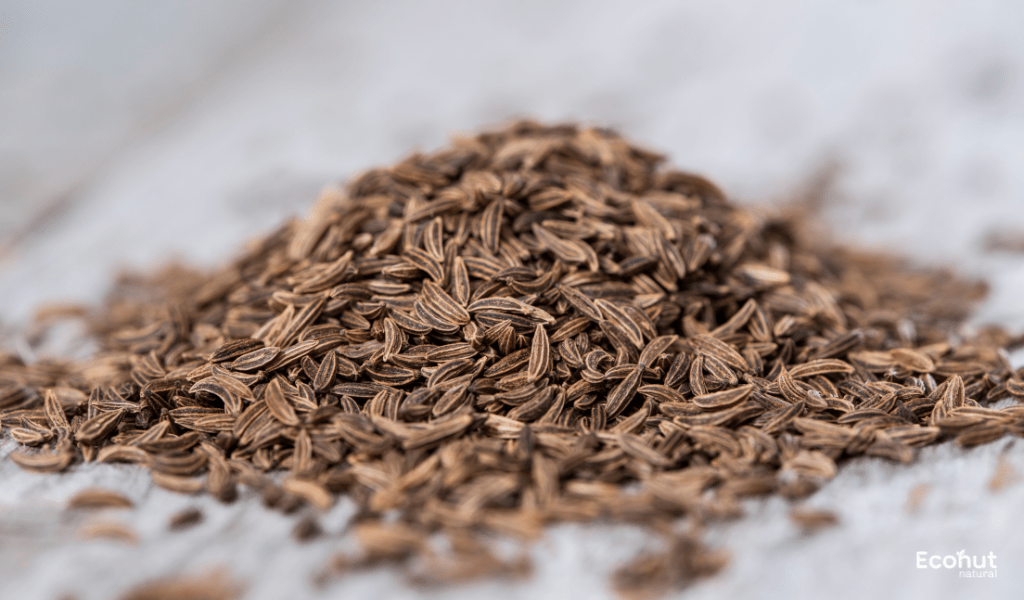Caraway (Carum carvi) is a very useful and important herb that is utilized to treat conditions related to the uterine and digestive systems. Anti-microbial and anti-spasmodic seeds are effective.
Caraway seeds are high in lipids, proteins, and carbs. Minerals like iron, calcium, phosphorus, niacin, salt, and thiamine are abundant in this herb. Caraway seeds are used to make a very aromatic and effective oil since they contain a significant quantity of carovene.
Description
The biennial plant Carum carvi is a member of the Umbelliferae families. The plant resembles a carrot in appearance, with feathery leaves that are finely split like threads and a 20–30 cm stem. With tiny white or pink blooms arranged in umbels, the main flower stalk is 40–60 cm long.
Botanical Name:
Carum carvi
Family:
Umbelliferae
Leaves:
Feathery, finely divided leaves that resemble carrot plants with divisions that resemble threads on 20–30 cm stems, they grow.
Flowers:
Little blooms, pink or white, with intricate umbels composed of five to sixteen irregular rays. The height of the primary bloom stem varies from 30 to 60 cm.
Fruits:
The plant’s most often utilized portion. These are roughly 3 mm long, smooth, crescent-shaped, laterally compressed achenes with five pale ridges and a pleasant aroma when crushed. They might be light brown or dark brown in color.
Roots:
Thin taproot with a growth length of 8 to 9 inches
Habitat:
Crop at elevations of 3000–4000 meters in the hills like Kashmir, Chamba, and Garhwal, and in plains during the colder months
Parts Used:
- Fruit
- Seeds
Dosage
- 1/2- 2 gm
Chemical Constituents
The active chemical constituents of Caraway carvi are α-pinene, α-terpineol, α-farnesene, β-caryophyllene, γ-terpinene, carvone, carvone, camphene, citronellol,β-myrcene, β-ocimene, β-pinene, cuminaldhyde, eugenol, germacrene-D, limonene, linalyl acetate, nerol, p-cymene, terpinene-4-ol, and thymol.
Common name:
Krishna jeerak, Kala jeera
Other Language Names of Caraway (Carum carvi)
Telugu name – Sheemajilkar
Malayalam name – Karunjeeraka, Karinjeerakam
English name – Black caraway, Black cumin, Indian caraway
Bengali name – So-jeera
Sanskrit name – Krishna jeeraka
Hindi name – Syahjeera, Kali jeera
Persian name – Jeerya-riza, Zira
Marathi name – Shahaajire, Jeere
Arabic name – Kamuna, Kamoonearamani
Espernato name – Karvio
Kannada name – Karijireege, Shahajirige
Tamil name – Karamjeeragam, Shimayishiraga
Francais name – Carvi
Gujarati name – Shaahjeeru
Italiano name – Carvi
Kashmiri name – Krihunzur
Scientific Classification
| Kingdom | Plantae |
| Sub kingdom | Viridiplantae |
| Division | Tracheophyta |
| Class | Magnoliopsida |
| Order | Apiaceae |
| Genus | Carum |
| Species | Carvi |
| Order | Apiales |
| Family | Umbelliferae |
Ayurvedic Properties
Hindi/Sanskrit
- Rasa -Katu
- Guna -Laghu, Rooksha
- Virya -Ushna
- Vipaka -Katu
English
- Taste -Pungent
- Physical Property-Light, dry
- Potency- Hot
- Metabolic Property (After Digestion)-Pungent
Caraway (Carum carvi) Uses
- Caraway seed oil has a strong aromatic quality and is used to treat delirium and convulsions brought on by drug interactions, in addition to adding fragrance to other medications.
- By removing kapha from the uterus, it effectively improves irregular menstrual cycles and dysmenorrhea.
- Gingivitis can be effectively treated with it. Gum inflammation, edema, or redness is known as gingivitis.
- The infusion made from this herb is beneficial to women’s uterine health as well. It works wonders to relieve excruciating uterine discomfort and is also used to flush pollutants out of the uterus.
Caraway (Carum carvi) Benefits
Helps Heal Injuries:
Caraway oil is a good antibacterial, it aids in the healing of wounds. This eliminates any fungus or bacterial growth that could desire to grow in the location of those injuries, ensuring that no illnesses develop there in the future. Additionally, it makes sure that the wound heals without leaving ugly scars on the skin.
Caraway Seeds for Digestive Health:
Caraway aids in the restoration of intestinal yeast and bacteria for ailments like irritable bowel syndrome. Additionally, caraway possesses certain antibacterial qualities that may help fight off germs like streptococcus and promote the growth of good intestinal bacteria like bifidobacteria, a frequent component in probiotics.
Anti-Inflammatory:
Caraway seed powder, have anti-inflammatory qualities that may aid in reducing inflammation in the body. This could be beneficial for conditions like arthritis and other inflammatory issues.
It Is Anti-Ageing:
The anti-aging properties of caraway oil are an additional benefit. This is a result of its capacity to promote the skin’s rapid cell growth, which eventually replaces and eliminates the body’s dead skin cells. This has the effect of making the person appear younger by eliminating wrinkles from their body, especially from their face.
Weight Management:
Caraway seed powder may help with weight management by increasing metabolism and decreasing hunger, according to certain research.
Also Read: Indian Squill (Urginea Indica) – Uses, Benefits & Side Effects
Caraway (Carum carvi) Side Effects
Gastrointestinal issues:
Overindulgence in caraway seeds can result in heartburn, gas, and bloating in the digestive tract.
Skin irritation:
Certain people may experience rashes and irritation when caraway oil is applied directly to their skin.
Blood sugar interaction:
It’s possible that caraway lowers blood sugar. If taking insulin or medicine for diabetes, those with the condition should speak with their doctor before consuming excessive amounts of caraway or caraway oil.
Pregnancy:
Given that caraway oil may induce menstruation and may result in miscarriage, it is probably dangerous for pregnant women to use.
Conclusion
A versatile spice, powdered caraway seed may benefit digestion, inflammation, and overall health in a number of ways. Its use in traditional medicine throughout history highlights its potential therapeutic purposes, but its culinary applications add flavor and richness to a wide range of meals. As with any natural medicine, it is important to consult a healthcare provider before using caraway seed powder for medicinal purposes, particularly if you have underlying medical concerns or are taking medication.
FAQS
What is Caraway used for?
It has long been used as a spice in food and drink and as a complementary herbal remedy for gastrointestinal disorders such dyspepsia, different spasmodic disorders, bloating, diarrhea, and flatulent colic.
What is the benefit of caraway fruit?
Digestive issues such as heartburn, gas, bloating, appetite loss, and moderate stomach and intestinal spasms can all be treated with caraway. Additionally, caraway oil is used to treat constipation, enhance urine control, help patients cough up phlegm, and destroy microorganisms in the body.
What negative impacts does caraway have?
Include nausea, eructation, flatulence, and heartburn.

